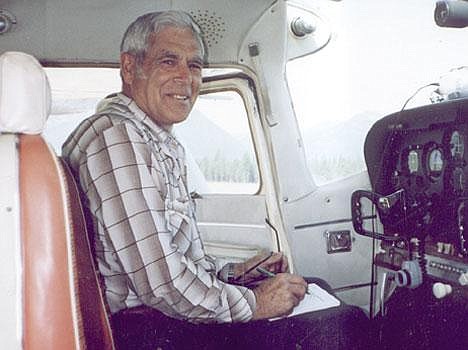Four-year-old boy's dream takes flight
By STEVE KADEL Western News Reporter
He was just a 4-year-old boy living on a ranch in southern Montana when the dream took hold.
Each day, Bob Groom went outside in time to watch the daily flight of an airplane overhead. He ran along and waved as it followed the railroad tracks across the Crow Indian Reservation near Benteen.
The pilot got used to the regular greeting, and began tipping a wing to return the hello. When weather was bad, Groom remembers, the plane flew so low he could see the pilot's face.
"Oh, I was gonna fly," he said last week, 71 years later.
His father, a rancher, just scratched his head when the boy started taking flying lessons at age 16.
"Flying?" the elder Groom asked. "What for?"
Bob Groom couldn't explain it, couldn't put his passion into words. But he wanted to fly badly enough that he worked part-time running the projector in Big Timber's movie theater to earn money for lessons.
"Then you walk up to the airport and it's gone in an hour," he said.
He began flying in 1947, completing his first solo flight in a Cessna 120 at Big Timber airport.
"You just can't imagine how it feels when they kick you out on your own for the first time," Groom said.
Groom has accomplished plenty in the air since then, having flown for several public agencies as well as Mountain West Flying Service.
He recently received the Wright Brothers' "Master Pilot" award from the Federal Aviation Administration. It signifies a pilot who has shown professionalism, skill, aviation expertise and safe flight operations for 50 years or more. Besides receiving a plaque with certificate, Groom's name will be entered in the "Roll of Honor" book in FAA's headquarters in Washington, D.C.
In his typical low-key way, the Libby resident shrugged off the honor.
"There are a lot of people who've done more than me in a shorter time," Groom said. "I've just been pecking away for so many years."
His resume includes piloting for Montana Fish, Game and Wildlife Department, the U.S. Fish and Wildlife Service, the U.S. Forest Service and Lincoln County Search and Rescue.
Libby's Wayne Kasworm, a U.S. Fish and Wildlife Service biologist, has flown with Groom for 20 years. Together they've tracked grizzly, black bear, deer, wolves, wolverines and other species involved in Kasworm's studies.
"You can't fly forever and not have a few exciting moments as far as weather and the plane, but I trust his judgment," Kasworm said.
Groom always hopes for "severe clear, quiet, peaceful days" to go aloft. Of course, that isn't always the case in northwest Montana.
Occasionally, Kasworm said, the two would take off but Groom suggested returning after a few miles because of bad weather. Kasworm never argued.
When bears are out of hibernation, Kasworm and Groom average four to five hours of flying per week to locate the animals.
"We've had an opportunity to see some pretty intriguing things from the standpoint of bears in mating season and courtship behavior," Kasworn said. "Occasionally there's a need to go down and look at an animal.
"We have to pick our conditions and places where we can get down safely and I can get a (camera) lens out the window."
Once they were tracking a collared bear in Canada. The men watched as it jumped into a small pond, swam around the perimeter a couple of times, then got out on the other side and went on its way.
"A couple of years later we saw an uncollared bear do the same thing in the same swimming hole," Kasworn said. "It was amazing that we would see the same thing years later in the same spot given all that country."
Groom has flown lots of different aircraft. He even got a chance to pilot a P-51 Mustang, a World War II-vintage fighter. That may have been his biggest thrill, he said.
But Groom considers the bi-winged acrobatic plane he co-owns with Mike Helburg the most fun to fly.
He takes pride in the accomplishments of pilots he has trained. One of his proteges flew DC-10s as a captain for Northwest Airlines until mandatory retirement at age 60.
"There are a lot of people around Libby that I taught to fly," Groom said. "I like that, when they go and do something with it."
He has no plans to relinquish the throttle until he can't pass his annual physical exam. The way Groom sees it, he still has room to improve.
"I don't think you ever quit learning, and hoping the near mistake you made doesn't happen again. It takes a long time to learn judgment."

